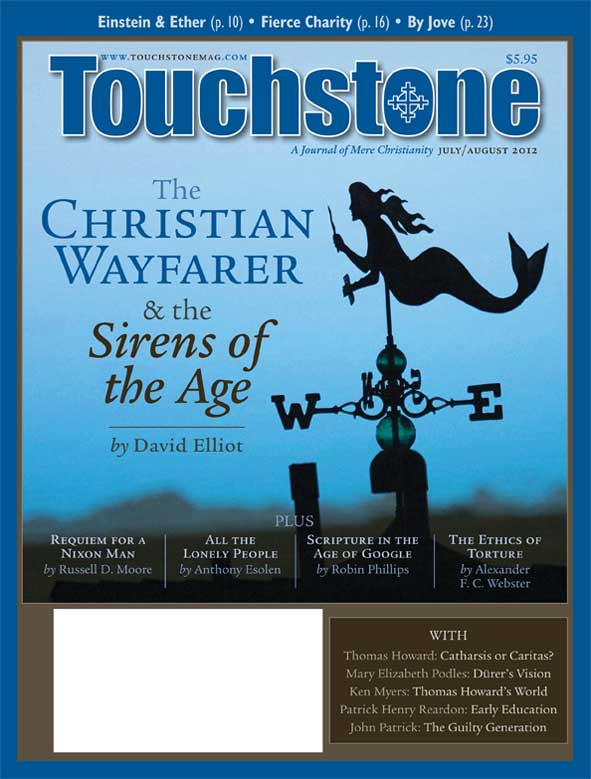Feature
All the Lonely People
The Corrosive & Far-Reaching Fallout of the Sexual Revolution
I have been thinking about loneliness. We assume it is a sorrow that afflicts unlucky people: those who have outlived their friends, who are painfully shy, or who have been abandoned by their families.
Would that it were only so. Central to human existence, says the court decision justifying the alienating of one's unborn children, is the right to determine for oneself the meaning of the universe. "I am myself alone," says the hunchback Richard of York, plotting the overthrow of his own brothers in his quest for a solitary and joyless crown. "From this time on I never will speak word," says Iago. He has accomplished his revenge against his captain, Othello, and now, facing torture and execution, declares himself alienated from the whole human race. "Myself am Hell," says Milton's Satan. That short sentence encapsulates the whole mystery of evil.
Ultimate Alienation
When Dante and Virgil are nearing the end of their first day on the slopes of Purgatory, they wonder how they should use the last hour of daylight to best profit. Dante looks round and sees a soul, all alone, and suggests that they ask him the best path to climb. The soul seems a man of dignity: he remains still, "as a lion / at rest will watch, and never turn his head." But if we suppose he is a solitary fellow, enjoying his separation from the rest of mankind, we are in for a surprise.
Virgil asks him about the road, and the man does not immediately reply, but asks his own question in turn, one whose answer will place the poets in a society: "Where were you from?" Virgil begins with the name of his native city, "Mantua," when the soul suddenly breaks in upon him: "O Mantoano, io son Sordello / della tua terra!" "We share one country, you of Mantua! / I am Sordello!" And the two embrace.
What follows is also remarkable. Dante suspends the narrative, and for the last 76 lines of the canto launches into a bitter invective against the Italian cities of his day, particularly his native Florence. Even in Purgatory, so far away, he says, that soul rose up in joy merely at the name of his native land, while back in the world of the living, people gnaw one another, "and so near / as those united by a wall and ditch!"
Dante illustrates for us the implications of violating Christ's first commandment, with its two axes of unity: "Thou shalt love the Lord thy God with all thy heart and soul and mind and strength," and "Thou shalt love thy neighbor as thyself." Sometimes the most elementary things are the hardest to see, just because we fog our minds with the excuses of egotism.
But here is the truth: Men are united with one another in their love for God; and sin bends us towards non-being, away from God and one another. That consequence is shown with terrible finality at the bottom of Hell, in the frozen sinkhole of the traitors. Only their heads stick up out of the ice, a traitor here, a traitor there, without any human connection; and in the two cases where we do see one traitor in physical contact with another, it is to make all the more manifest and painful their alienation. So Ugolino gnaws at the back of the brain of the archbishop Ruggieri who betrayed him, and the brothers Mangona, who slew one another, butt head to head without end, each battering himself against the visage of the man he should have loved but did not.
Sin Brings Loneliness
I recall these scenes to venture an axiom of human life. All sin is destructive not only of the individual soul, cramping it, wrenching it towards death. It is destructive also of human community. There is something essentially lonely in sin.
No sin is exempt from this law. That includes the sin that may long deceive us with its appearance of communion: the sin of licentiousness. Perhaps indeed it reveals the loneliness all the more painfully, as it mocks us with its show. The revolution of forty years ago held forth the promise of communion. "If you can't be with the one you love," sang out Neil Young at Woodstock, "love the one you're with." At which many a young man and woman looked to the nameless person beside them and said, "I'm with you."
Priests and ministers have been slow to protect young people against this delusive promise. It's easy to ascribe this reluctance to cowardice. But there may be a less indignant way to look at it. Dante understood exile, but not, I think, loneliness. The lives of men in his time were too intimately bound one to another; and then, at the heart of every city and town and village, and every human life with all its glories and shame, stood the church, calling them all to join in worship, in joy and sorrow, in petition and thankfulness, at the beginning of life and at its end.
Indeed, the words "lonely" and "lonesome" do not appear in English before the sixteenth century. It required the genius of Dante to see the lonely-making quality of sin, precisely because loneliness was far from his lived experience. Just so, our priests and ministers, though they may well know what it is to be lonely, may also have no notion of exactly how sins of sexual license, which seem at first to satisfy man's longing not to be alone, have resulted in cultural dissolution. It is a vast moonscape governed by that most hopeless of prefixes: ex-towns, ex-neighborhoods, ex-fraternities, ex-congregations, ex-marriages.
Then it behooves us who have experienced the loneliness to speak up.
Virtue Brings Sociability
In a healthier time, when young people were expected to live up to a virtue, and not merely to keep themselves sanitary, there were plenty of venues for bringing boys and girls and young men and young women together, in fairly innocent fun. What made this possible was the tacit rule of virtue.
It is really not hard to understand. Imagine a culture of liars and cheats. In such a place, when once you attempt to join someone else in business, even if it is of very modest scope, your actions are shot through with danger. You may feel it to be too momentous a thing to join a partner in buying a small parcel of land, or in cooperating to fill a contract to provide a builder with beams. The lying and cheating hurts the liars and cheaters, most obviously and profoundly; but it does its evil work to keep good people apart, too, or people who in better circumstances would be good.
When the expectation of virtue ruled, it was not a momentous thing for a boy to ask a girl to a dance, or to go watch a ballgame, or to accompany him to the ice cream social, or to a big party. That meant, if we consider the matter for a moment, that there would be many such events for him to choose. Since a promise to go have some fun at a square dance was just that and no more, boys and girls enjoyed the mutual trust that the virtue provided—a great free field of social activity, some of it no doubt youthfully romantic, between staying at home alone or hopping in bed. That was more than space and time for the individual to grow. It was space and time for the sociality of boys as boys and girls as girls.
That's long gone. It was already becoming a thing of the past when I was young. The Lonely Revolution might have given a Get Out of Jail Free card to the really few young people who would choose licentiousness for its own sake, but it hurt everyone else. Even if there isn't quite as much bedding down as our youth suppose, the expectation of it, or rather the implicit promise of it, or the veiled threat of it, looms nevertheless. And that is enough to prevent all kinds of young people from getting together in healthy ways. Those who can imagine that a girl might go ice-skating with them, but never anything more, shy away from asking even about the ice-skating. Those who try to remain faithful to the natural law, their consciences, and the teachings of the Christian faith must be content to stand aside.
No Help for the Weak
Then there are those, whose numbers are great indeed, who retain a sense of right and wrong in sexual matters, but who are not strong enough to resist the temptation. We do not wish to probe the hearts and minds of such people. The experience is too painful. We shrug, and say that so long as both people in the bed agree to be there, that is their business and no one else's. And thus, in our hardheartedness, we deprive their consciences of any support, and the confusion and pain they experience of any remedy.
Imagine a young man living far from home for the first time in his life. He has attended Christian services every Sunday with his family. He hasn't been given much moral instruction, in part because the grownups in charge have taken things for granted. Still, he has a keen mind, and he knows what the commandments say. In high school he had a girlfriend, and every so often in the evening they would drive alone down into an abandoned valley, parking well off the road, and spending an hour or two listening to the radio and kissing. They didn't do any more than that, not because they were particularly pure, but because they still sensed that more is what you do when you are ready for a child.
College, however, is different. Rooms for males and females are assigned randomly throughout the freshman dormitory. What events are held for the special benefit of boys and girls wishing to get to know one another? None at all.
Oh, there is freshman orientation. There are happy-clappy lectures on the utility of what in rougher and more honest days were called rubbers. There is some garbled attempt to suggest that the act of complete self-giving that sexual congress implies might raise moral issues. But there is no longer any language for speaking of such things. Obscenities may be uttered, but not subtle moral insights. The one four-letter word that might raise a blush? Love. One enlightened fellow in a discussion group proposes that "mechanical sex" can be cool. Not cold, but cool. Some of the females glance away, but no one dares the mildest rebuke. There's a monster who needn't worry about his feed.
A Lonely Boy's Story
The boy is lonely. Let us affirm this fact with the utmost certitude. He is lonely. How can he not be lonely? Every single institution that once made for sociability has been desolated. He knows many young people who are the bystander victims of divorce. Theirs is a world of transience, without even the romance and camaraderie of hobos on the road. The schools are vast and anonymous, breeding grounds of pathology. One of the high schools near his own had to shut down for a week when a lonely boy, a "gunman" as the papers called the fifteen-year-old, opened fire upon students in the library. No one could find a reason for it, not his mother, nor his stepfather, nor the brother who lived with his father, nor the sister who lived with their aunt. Indeed, there was no reason for it, unless it was that great Unreason, that Nothing at the core of his life.
Not lonely? He does not know the names of the people who live a hundred yards down the street. No one does. Why would anyone bother? People come and go. Spouses come and go, boyfriends and girlfriends come and go, the hookups after the parties come and go. He is lonely. But he is attracted to a certain girl.
In a healthy time, she would have been a Rosalind to his Orlando. But it is not a healthy time. So, what should have been girlish bravery is a tad forward and loose. What should have been womanly insight into the heart of another has degenerated into manipulative cunning. He, meanwhile, has little moral strength. He needs desperately. That need will override every other consideration. He might have been gallant, but now he will give rein to his basest impulses.
One night finds them on the floor of his dormitory room. The hands rove where they have no business roving. He registers a moral reservation: "Thus far, and no farther." That is sheer hypocrisy, as he well knows. He wants what he wants, but he does not have the honesty to admit it. She reads that desire and takes the initiative. When he balks, "But you might get pregnant," she does something else that won't incur that risk.
So the fellow is hooked. His moral reasoning wasn't sophisticated to begin with, but now he concocts excuses for himself, fooling himself into believing that they two might get married someday—that will make everything all right. His family relations recede into the distance. He is happy now, but it is a frenzied, hectic happiness, a dark happiness. Far from bringing him out of himself in generosity, the self-contradicting fornication makes him more selfish than ever. He sneers when she tells him that her father, a divorced man with no faith, has some qualms about what they are doing. Why should her father care?
Torn Souls
How many of these liaisons last? If one is fully human, and not a subhuman wretch, the marital act brings to one's consciousness a kind of metaphysical union: as Christ says, they two become "one flesh." Then every tearing away from that one flesh is like tearing a stubborn root out of the soul.
Far different are the vicissitudes of an innocent crush, no matter how long it may last; no matter even if there are prospects of marriage. For afterwards we may look upon the one-time object of our hearts with a modest affection, and no remorse. There will have been no lies, no shabby encounters, no cruel reduction of the other to an object of appetite.
Yet we encourage our young people to produce just such bad memories. And every time the sexual liaison is torn apart, something of one's humanity is torn out with it; and one grows a little harder, less gentle, more importunate, less patient, more cynical, less carefree. It ages the heart, and the fresh face of the youth belies the creases and wrinkles within. The flesh is in color, but the reality is noir.
Indeed the liaison does not last, and the loneliness returns, sometimes impenetrably dark. The young man, by now a moral cripple, cannot even express what is wrong with him. He wants love, but he will settle for much less. He will settle for not being alone. He will lie to himself and to any girl he can, rather than be alone.
Here there are two possibilities. If he has learned a certain slickness of manner, and if he has decayed sufficiently to be able to banish from his mind all moral scruples, and all genuine longing for love, he will find someone or other to share a bed, but his selfishness will have become a kind of callus on the soul, which protects him from feeling loneliness because it protects him from feeling much of anything at all. If he has not learned that manner, and if he still wishes for love, his torment will be far greater, but there will be, here and there, a seedling of hope, a touch of green in the parched plain.
Where Youth Is Found
I am not exaggerating. I have spent all my adult life around young people, thousands of them. I observe them closely. They talk to me. Wherever the sexual revolution has prevailed and planted its banner on the ramparts, there I find that old hardheartedness, the disillusionment, and the loneliness. Where it has won many evil victories, but does not enjoy complete conquest, I find a terrible struggle—the look in the eyes of young people who want very much to enjoy the fullness of love in a fruitful marriage, and who know that the commandments of Jesus, like his love, are never out of date, but who simply do not know how to obtain what they long for, and who are given very little help. Instead, they are the objects, not of outright scorn, not at such places, but of bemusement, and occasionally curiosity.
And where Belial has been defeated? Oh, he may pick off a sentry here and there, and his incessant attacks from the vantage of mass entertainment may cause a lot of needless commotion. But in those places I see youth. And there they go hand in hand. •
Anthony Esolen is Distinguished Professor of Humanities at Thales College and the author of over 30 books, including Real Music: A Guide to the Timeless Hymns of the Church (Tan, with a CD), Out of the Ashes: Rebuilding American Culture (Regnery), and The Hundredfold: Songs for the Lord (Ignatius). He has also translated Dante’s Divine Comedy (Random House) and, with his wife Debra, publishes the web magazine Word and Song (anthonyesolen.substack.com). He is a senior editor of Touchstone.
subscription options
Order
Print/Online Subscription

Get six issues (one year) of Touchstone PLUS full online access including pdf downloads for only $39.95. That's only $3.34 per month!
Order
Online Only
Subscription

Get a one-year full-access subscription to the Touchstone online archives for only $19.95. That's only $1.66 per month!
bulk subscriptions
Order Touchstone subscriptions in bulk and save $10 per sub! Each subscription includes 6 issues of Touchstone plus full online access to touchstonemag.com—including archives, videos, and pdf downloads of recent issues for only $29.95 each! Great for churches or study groups.
Transactions will be processed on a secure server.
more on sex from the online archives

28.3—May/June 2015
Of Bicycles, Sex, & Natural Law
Describing Human Ends & Our Limitations Is Neither Futile Nor Unloving by R. V. Young

28.2—March/April 2015
Man, Woman & the Mystery of Christ
An Evangelical Protestant Perspective by Russell D. Moore
more from the online archives
calling all readers
Please Donate
"There are magazines worth reading but few worth saving . . . Touchstone is just such a magazine."
—Alice von Hildebrand
"Here we do not concede one square millimeter of territory to falsehood, folly, contemporary sentimentality, or fashion. We speak the truth, and let God be our judge. . . . Touchstone is the one committedly Christian conservative journal."
—Anthony Esolen, Touchstone senior editor











